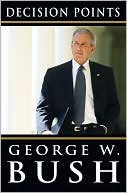 |
In the early chapters, Bush describes his decision to commit his life to Christ, to marry Laura, and to quit drinking. Clearly, those three decisions would impact his life and other decisions he would make. He placed high value on those three.
As Bush made vocational choices, eventually the decision was made to enter politics and run for office resulting in successful races for the Texas governorship and for U. S. President. At that point he and his dad (Bush 41) became the second father and son to both serve as President -- the first being the second and sixth in our nation's early history (John Adams and John Quincy Adams).
The decision points Bush majors on are those that made plenty of news and are still doing so -- such as decisions to involve America in Afghanistan and Iraq. He discusses the background to those decisions and clearly defends them while accepting blame for not adjusting more quickly to the changing situation on the battlefield.
An important decision point that got lost in the political environment of post-9/11 America stood out as prophetic and courageous to me: his stand on embryonic stem cell research. On August 9, 2001, Bush announced his stem cell decision--to permit federal funds to be used for research on existing stem cell lines, and banning federal funding of new embryo lines. He based that decision on the idea that to open new lines meant destroying human embryos--potential life. The President drew much criticism for his stand, however a breakthrough in late 2007 exonerated his decision by demonstrating a scientific path to the research that did not include the moral and ethical dilemmas that had generated Bush's decision. One well known critic of the stem cell stand concluded -- "The verdict is clear: Rarely has a president--so vilified for a moral stance--been so thoroughly vindicated."
There were certainly other dramatic events during Bush's time in office, but none more memorable than September 11, 2001. Perhaps only the attack on Pearl Harbor equals it in contemporary times, and both Roosevelt in 1941 and Bush in 2001 were greatly affected by those events in the decisions they subsequently made.
Leadership involves making decisions. The quality of those decisions demonstrate what kind of leader one has become. Our decisions and choices often impact the future ones we may need to make. It is essential that a person's value system be the major platform from which decisions are guided. Whatever a person's opinion of George W. Bush"s presidency is, I believe that he made decisions based on the best advice and information he felt he could trust, and on his sense of values. His choices did not appear to be poll driven.
I enjoyed Decision Points and recommend it others whether they are fans of his or not.
No comments:
Post a Comment